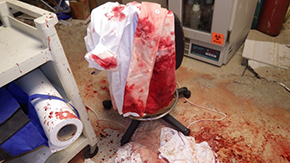|
FDA Ban on Powdered Gloves

On January 18, 2017 the Food and Drug Administration (FDA) added Powdered Surgeon's Gloves, Powdered Patient Examination Gloves, and Absorbable Powder for Lubricating a Surgeon's Glove to their list of banned medical devices.
This ban has created some confusion regarding the use of these gloves in research laboratories so I hope to clarify who is impacted by this ban in my article found here.

Disinfectant Change for the Public Water Supply

Beginning on January 27th, Citizens Energy Group, the provider of municipal water in Indianapolis, will change the disinfectant used to ensure that the water is safe to drink from a biological perspective. Citizens will switch from a family of chemical compounds known as chloramines to free chlorine.
Please click here to learn more about how this change may impact you.

Researcher injured in University of Hawaii lab explosion files lawsuit

As discussed in previous edition of Lab Notes, the independent investigation by the University of California (UC) Center for Laboratory Safety into the March 16, 2016 explosion in a University of Hawaii at Mānoa laboratory was completed and the likely cause of the explosion was the use of a pressure gauge not approved for flammable gas use which release an electrostatic charge when touched into an ungrounded secondary hydrogen cylinder which was also not approved for flammable gas use.
The following links are to documents that summarize the findings.
The victim of this accident has filled suit against the university for the damages resulting from the explosion. which includes loss of her arm.
The lawsuit claims personal injury, negligence, gross negligence, failure to warn, dangerous condition of public property, negligent infliction of emotional distress, intentional infliction of emotional distress, and loss of consortium.
The cost of unsafe behavior goes beyond OSHA fines. A life or limb cannot be replaced and that cost is even greater to the individual than the financial cost of the liability of the university.

Infectious Waste Sharps Disposal Options
 Campus laboratory safety inspectors have noted increasing inconsistencies regarding how certain sharps waste are being managed in campus laboratories. At issue is how hard plastic serological, glass Pasteur pipettes, pipette tips and hard plastic Petri plates are being packaged and handled through disposal. Campus laboratory safety inspectors have noted increasing inconsistencies regarding how certain sharps waste are being managed in campus laboratories. At issue is how hard plastic serological, glass Pasteur pipettes, pipette tips and hard plastic Petri plates are being packaged and handled through disposal.
Environmental Health and Safety (EHS) has worked over the years with the Indiana State Board of Health and the Marion County Public Health Department to develop alternative disposal procedures in lieu of hard-plastic, single-use, disposable sharps containers in an effort to provide an appropriate level of worker safety while providing for significant cost savings.
To read more about disposal options that have been approved by both regulatory agencies, please click here.

Winter weather tips: Penguins, de-icers and more
Winter is here, are you prepared? Please click on the picture below for some excellent tips for being prepared this winter from our emergency management and continuity team.

|